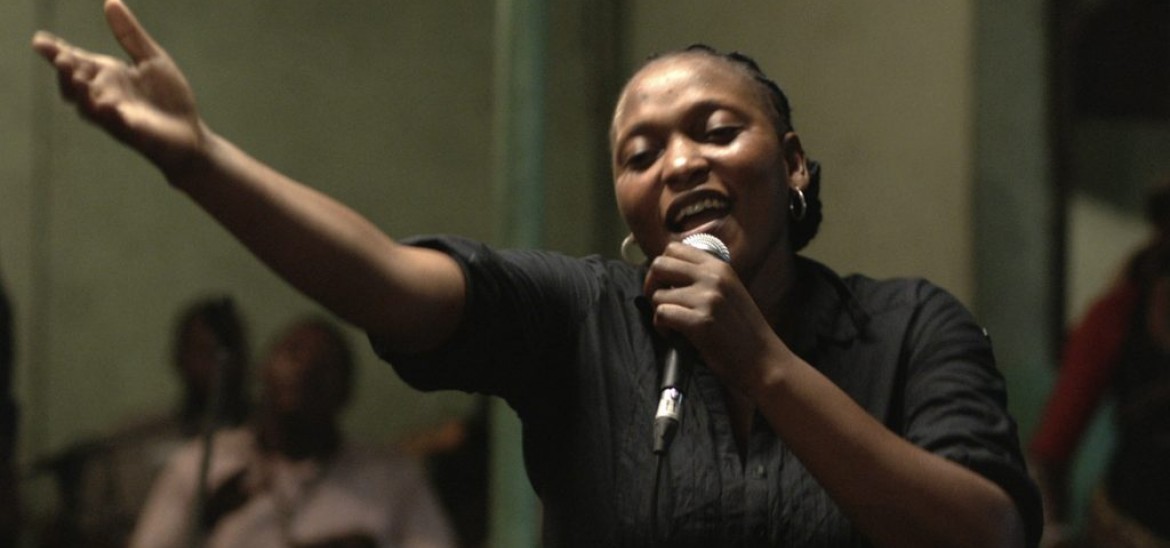Into Film Clubs
Find out everything you need to know about starting an Into Film Club.



Félicité is a vibrant new film set in Kinshasa, the capital city of the Democratic Republic of Congo. It tells the story of Félicité, a strong-willed, independent woman working as a singer in a local bar, struggling to make ends meet for her and her son, Samo. When Samo is badly injured in a motorcycle accident, her world is turned upside down. She needs to raise some cash quickly to pay for an emergency operation to save her child's leg. In desperation, Félicité takes to the streets, seeking out friends, family, and - most audaciously - a wealthy local landowner to ask for their help. The city is electric, pulsating with life and joyous music, but will Félicité be able to find the help she so desperately needs amid the chaos?
Kinshasa was chosen as the setting partly because it was an environment the filmmaker (French-Senegalese director Alain Gomis) was not familiar with. He was drawn to the city's intense energy, as well as its complicated recent history. The Democratic Republic of Congo has experienced extreme turmoil over the last century, taking in colonisation, dictatorship and war. The cumulative effect of this has created a society of immense underground wealth juxtaposed with almost unimaginable poverty. People there feel somewhat abandoned; a fake article in the country's constitution states "you're on your own", leaving the impression that there is no state structure to support people, even in the most challenging circumstances.
Filming in a chaotic city brought challenges, making the role of location manager (the person who identifies the sites a film will shoot particular scenes in) all the more crucial. They combined in-depth knowledge of the city with an extensive list of contacts, enabling filming to take place pretty much anywhere they wished. This included backstreets and hidden passages that were unlikely to be found by newcomers, and deploying locals to participate in the filming process. Such a process brings certain risks; the film had intelligence services on site the entire time to protect the production and the individuals involved. The resulting footage is remarkable, capturing an intense authenticity, with the city defining the finished film as much as its script and central cast.
Another important factor was Kinshasa's musical scene, which plays a defining part in Félicité. Particularly crucial are the wonderful Kasai Allstars orchestra, a collective of 15 musicians brought together from different orchestras across the province. They blend traditional genres with more modern sounds to reflect the unique creative spirit found all over Kinshasa; a vibe made more remarkable considering the turbulent politics of the area.
Lead actress Véro Tshanda Beya was cast as a result of her live performances with the Kasai Allstars. Despite little previous acting experience, she was somebody who could convey the daily struggles of a character in extreme circumstances, but who could also see the other side, thanks to the power of music. Like the stars of Hollywood musicals, Félicité finds solace in song and the ability to express herself through music. But whereas in most musicals characters are singing about love or happiness, Félicité is singing as part of a need to simply survive.
The film does not follow conventional narrative beats - its main storyline is often side-tracked while Félicité deals with, say, a problem with her fridge - and she still needs to go to work and perform every night. This reflects the filmmaker's ambition to show life as actually lived, rather than how cinema might normally tell the story. Félicité is a remarkable character: there is nobody quite like her in other films. This uniqueness was deliberate, in order to avoid comparisons with figures from the films of other nations, and instead form part of a distinctive voice in African cinema, creating a heroine that reflects and speaks to modern Kinshasan culture.
Félicité won 6 prizes (the most of any film ever) at the African Academy Film Awards, an event which aims to unite the continent through arts and culture. Félicité is an important addition to modern African cinema, where films are rooted in the culture they are depicting, and do not suffer from the cultural appropriation that has often burdened external cinematic representations of areas of the continent. Timbuktu also had success at these awards, and other notable films from the region on the Into Film catalogue include Tsosti, A Screaming Man, Felix and joyful documentary Benda Bilili!, which depicts a similar Congolese musical scene to that seen in Félicité. African cinema remains fairly poorly served in the UK. With luck, films like Félicité will help bring about the arrival of many more stories that allow us to understand more about the lives of people in cultures very different to our own.
Félicité is released by MUBI on Nov 10 felicitefilm.com
Viewing 4 of 4 related items.

Find out more about our streaming service, designed specifically for UK schools.